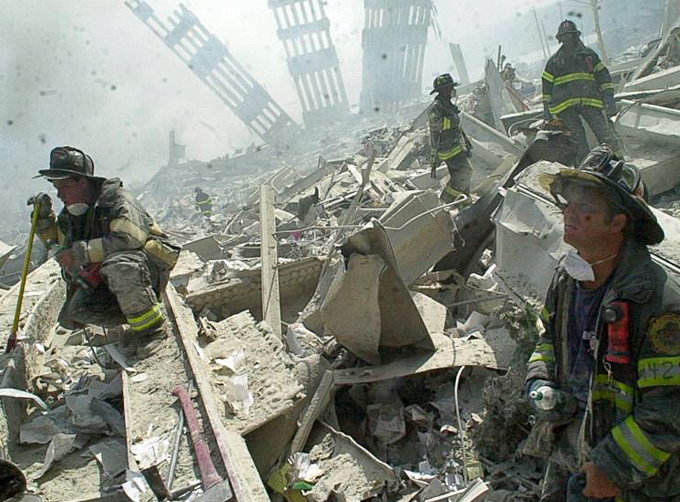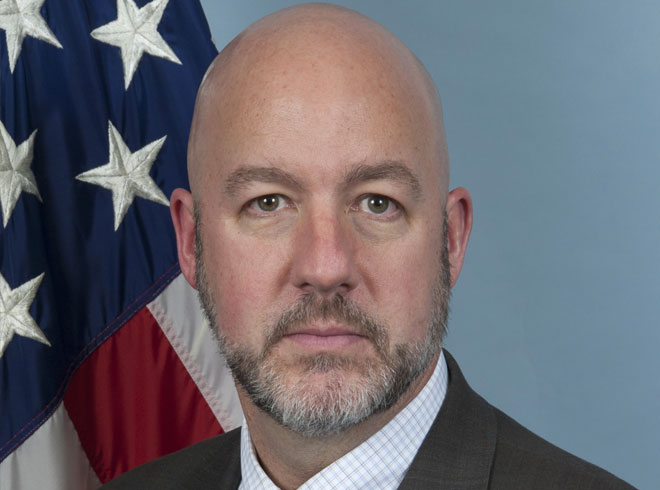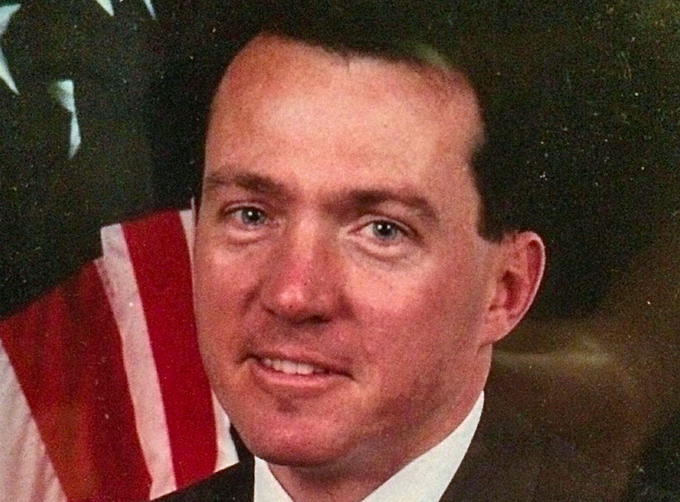
By Del Quentin Wilber, The Los Angeles Times
FBI Agent Dave LeValley was driving to work in Manhattan when he saw the first jetliner strike the World Trade Center on a bright September morning 17 years ago.
He quickly parked his car and sprinted to the scene, where he scoured for evidence and helped survivors while dodging falling debris and bodies.
When the first tower collapsed, he dove into a bodega, escaping with his life. What he couldn’t outrun: the toxic cloud of dust.
“We saw him a couple of hours later, and he looked like a snowman, covered head to toe in that stuff,” said Gregory W. Ehrie, a fellow FBI agent who spent several weeks with LeValley digging in the rubble.
(Special Agent in Charge David J. LeValley died Saturday, May 26. Courtesy of MLive and YouTube. Posted on May 26, 2018.)
LeValley, who joined the FBI in 1996 and rose to lead the bureau’s Atlanta office, was diagnosed in 2008 with chronic lymphocytic leukemia.
He died in May, age 53, from a different form of cancer that had metastasized to his brain.
FBI officials and health experts say both were likely caused by carcinogenic fumes and dust after the Sept. 11 attacks.
While one FBI agent was killed in the attacks, 15 have died from cancers linked to toxic exposure during the subsequent investigation and cleanup, the FBI says.
Three of them, including LeValley, have died since March — a rash of deaths that has reopened traumas of the worst terrorist attack in U.S. history and sparked fresh anxieties.
“It’s like Bin Laden is still reaching out from the grave,” said FBI Agent Thomas O’Connor, who is president of the FBI Agents Assn., a service and advocacy group for active and former agents.
“It affects us all in serious ways. People are dying, others are sick. Those that are not yet sick wonder — is that headache, is it really cancer? Is that sore hip really cancer?”
The 15 agents’ deaths, which the FBI says occurred in the performance of their duties, are only a tiny part of a much larger tragedy.
(After risking their lives to help others on September 11, 2001, more than 7,500 first responders have developed some form of cancer. Courtesy of NBC News and YouTube. Posted on Sep 9, 2018.)
More than 7,500 emergency responders, recovery and cleanup workers, and volunteers at the three Sept. 11 crash sites have been diagnosed with various forms of cancer, according to the World Trade Center Health Program, which is administered by the U.S. Centers for Disease Control and Prevention.
New York City officials say that more than 300 firefighters and police officers already have died from cancers and other diseases related to the attacks.
Alongside police and firefighters, FBI agents combed the rubble for victims and clues at the crash sites — the World Trade Center, the Pentagon and a field in Shanksville, Pa.
Scores of agents also spent 12-hour shifts sorting debris in warehouses and at the Fresh Kills landfill in Staten Island.
Most did not wear appropriate safety gear because agencies did not understand the danger in the poisons unleashed by burning jet fuel and other hazardous material, O’Connor said.
More than a dozen current and former agents who responded to the crash sites now have cancer, he added.
O’Connor’s organization has urged agents to sign up for the federal health program, which provides medical monitoring and treatment to more than 71,000 former responders and 16,000 other survivors.

He began to weep as he described watching his wife, Jean — also an FBI agent, who had rushed to the crash site at the Pentagon — open an envelope containing her test results.
She got good news — she was just fine. “You have no idea the stress this causes,” O’Connor said, “every day.”
FBI Director Christopher A. Wray has eulogized the three agents who died this year and said the deaths have profoundly affected him and his agency.
“It breaks my heart even more to see more victims, which is what they are, they’re victims of the 9/11 attacks in a different way,” Wray said in a statement, adding he spoke to LeValley and another agent, Brian Crews, before each died.
“The thing that really jumps out to me about the three agents whose memorial services I’ve been to is how just utterly selfless these people were,” Wray said.
“They were extraordinary people.”
(As America remembers September 11, 2001, INSIDE EDITION looked back at how the tragedy unfolded. It was a clear, sunny day when Al-Qaeda terrorists hijacked four passenger planes and crashed two into the World Trade Center. Courtesy of Inside Edition and YouTube. Posted on Sep 10, 2015.)
The FBI and the agents’ association are working with the Labor Department to declare the deaths and illnesses of agents who responded to Sept. 11 a result of performance of their duties.
That designation would make the victims’ families eligible for more federal benefits than the FBI provides by itself.
The Labor Department has so far determined that five FBI agents’ deaths were caused by their exposure to Sept. 11 toxins, according to the agents’ group.
The FBI and the agents’ association are seeking the same designation — and benefits — for the other 10 who died.
A Labor Department spokesman declined comment on specific cases, citing agency guidelines.
Doctors and experts caution that more research is needed to draw conclusive links between specific diseases and exposure to Sept. 11 sites.
Several studies, including two published this year in the Journal of the American Medical Assn., have concluded that emergency teams and other rescue workers at the World Trade Center faced an increased risk of cancer.
“We are now seeing a new wave of cancers coming in,” said Dr. Michael Crane, who runs a treatment and monitoring center financed by the federal health program at Mount Sinai Health System in New York.
“Most [first responders] just rushed down there and were not protected from the toxins in the air or the dust cloud. They were literally eating and breathing this material.”
“There were known carcinogens in the air.”
(On September 11th, at 9:37 a.m., live audio from Air Traffic Control and 911 First Responders were recorded as the event at the Pentagon unfolded. It is now the soundtrack for this intense revisit to that fateful day. Follow American Airlines Flight 77 as it veers off course, tracked by ATC toward its deadly collision with the Pentagon. Listen and watch as 911 First Responders race to the scene. It’s a moment in American History that will never be forgotten. Courtesy of the Department of Defense and YouTube. Posted on Sep 8, 2016.)
FBI Agent Scott McDonough breathed in those toxins for weeks.
A member of an FBI helicopter crew, he was dispatched to New York and spent several weeks leaning out of a helicopter to take close-up photos of debris.
“We flew through the dust,” he said. “It stuck to you. In your nose. In your lungs.”
He went to a doctor in 2016 after he spotted blood in his stool. Within weeks, he was undergoing surgery for rectal cancer, which the federal health program determined was related to his Sept. 11 work.
Since then, McDonough said, he has been cancer free. He is encouraging his colleagues to get evaluated.
“You have to do this,” he said, “for your family.”
Relatives of fallen agents described grueling medical battles, painful tests and difficult family transitions as FBI agents dedicated to investigating terrorism suddenly became its hidden victims.

Robert Roth was based in Quantico, Va., on Sept. 11 and drove straight to the Pentagon when he heard the news.
He spent days setting up search teams and gathering evidence, said his wife, Tresa Roth.
When he came home, Roth complained of a metallic taste in his mouth and a burning in his nose.
But as the months wore on, his wife said, he put the attacks behind him. An athlete, he kept in shape by running and lifting weights and was known for avoiding junk food.
“He was the office health nut,” she said. “Only protein and vegetables.”
While jogging with his children in 2006, Roth felt pain in his left hip, his wife said.
When the pain wouldn’t go away, a doctor ordered tests that revealed the father of five was suffering from a serious form of multiple myeloma. He died 18 months later.
(Tuesday is the 17th anniversary of the 9/11 attacks, and Americans are commemorating and rebuilding what was lost in 2001. Near Shanksville, Pennsylvania, the Tower of Voices was dedicated on Sunday as the final piece of the Flight 93 National Memorial. Courtesy of CBS This Morning and YouTube. Posted on Sep 10, 2018.)
“There is a heaviness, especially now, at the FBI,” she said of the rash of cancers. “
So many agents have it, that it’s now to the point where others are wondering when their time is going to come.”
Original post http://www.latimes.com/nation/la-na-pol-fbi-agents-cancer-20180829-story.html
Del Quentin Wilber is an enterprise and investigative reporter in the Los Angeles Times’ Washington bureau, focusing on criminal justice and national security matters. He can be contacted at del.wilber@latimes.com.
Learn More…
Why I Serve: How 9/11 Impacted the Lives of ICE Employees (Video)















